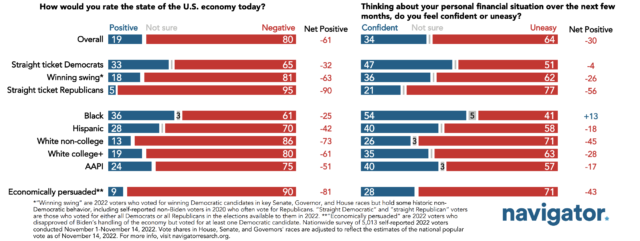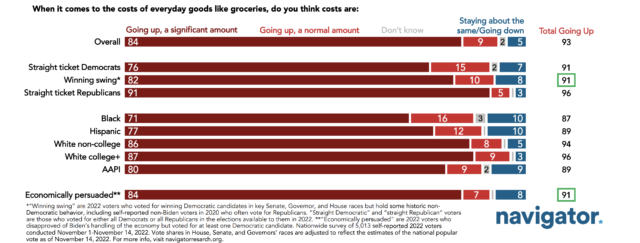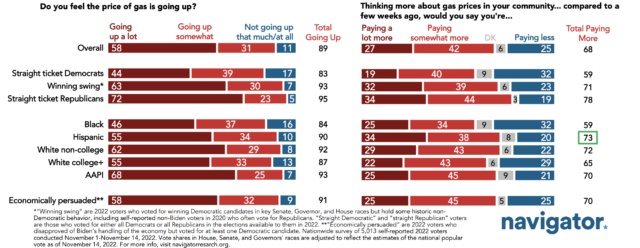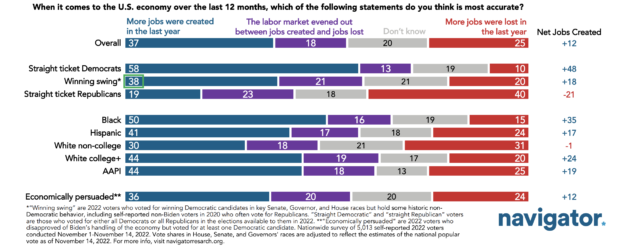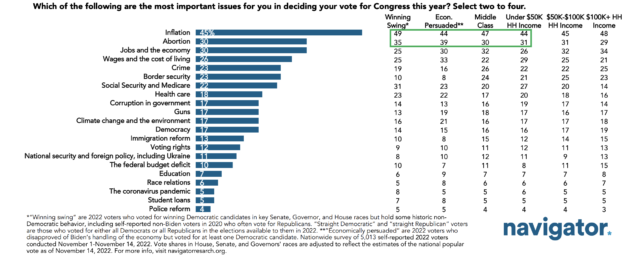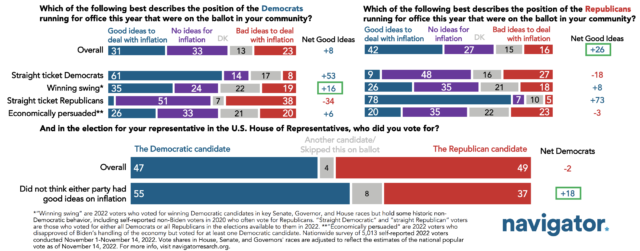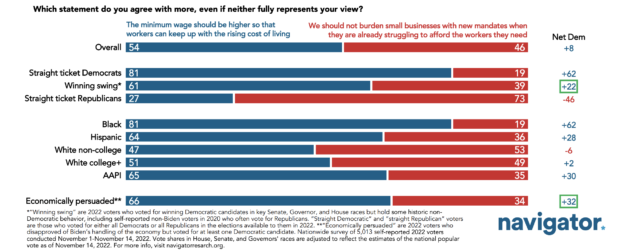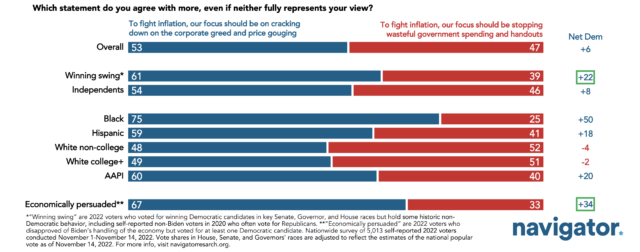What We Did: 2022 Midterm Voters Survey
The slides in this presentation are based on interviews with 5,013 registered voters who had already voted or planned to vote in the November election, with interviews conducted November 1st through November 14th . Support for Democratic candidates and Republican candidates in elections for Governor, Senate, and the House of Representatives have been adjusted to reflect the actual expected results as of November 14th . The analysis aims to provide a new tool for Americans to understand what happened in the 2022 election, why it happened…and what’s next.
Key takeaways
- Midterm voters were not optimistic about the state of the economy or their personal financial situations, with inflation as a prevailing pain point.
- Inflation was a key issue priority for voters – though overall and among critical persuadable audiences, abortion was nearly as important to their vote, followed by a range of other issues.
- Voters were not convinced that either party had a great vision for solving inflation, and those who were unimpressed by either party’s plan went for Democrats in the House by nearly 20 points.
Midterm Voters Held Deeply Negative Views on the Economy; Were Slightly Less Pessimistic About Personal Finances
Four in five voters rated the national economy negatively (80%) and 64% said they were uneasy about their personal financial situation.
- Among “economically persuaded” voters who disapproved of Biden’s handling of the economy, but ended up voting for at least one Democrat in 2022, 90% rated the national economy negatively and 71% were uneasy about their personal finances.
Everyday Costs Like Groceries Are a Bipartisan Pain Point, Even Among Voters Democrats Won
Roughly nine in ten (91%) “winning swing” voters who helped clinch victories for Democrats in tough races and 91% of “economically persuaded” voters who disapproved of Biden on the economy but supported at least one Democratic candidate in 2022 said the costs of everyday goods were going up.
Frustrations With Gas Prices Did Not Abate Before the Midterms, Though a Quarter Said They Were Paying Less
More than nine in ten “winning swing” voters who supported winning Democratic candidates in 2022 in tough races (93%) felt the price of gas was going up, while 71% said they were paying more for gas than they had compared to a few weeks earlier.
- Hispanic voters were among the most likely to say that they were paying more for gas compared to a few weeks ago (73%).
A Plurality of Voters Said More Jobs Were Created Than Lost in the Last Year
Two in five “winning swing” voters who helped push Democratic candidates to victory (38%) said more jobs were created in the last year.
- A majority (56%) of voters who disapproved of Biden on the economy but supported at least one Democratic candidate either said more jobs were created in the last year (36%) or the labor market evened out between jobs created and jobs lost (20%).
Inflation Was a Key Issue, And Among “Winning Swing,” “Economically Persuaded,” Middle Class, So Was Abortion
Among “economically persuaded” voters who disapproved of Biden on the economy but supported at least one Democrat, “winning swing” who clinched for Democrats in tough races, those who identified as “middle class,” and those who reported earning less than $50,000 annually in household income, inflation was a top priority followed closely by abortion.
Republicans Seen as Having Better Ideas on Inflation, But Democrats Won Voters Who Trust Neither Party on the Issue
One in three (35%) “winning swing” who clinched Democratic victories in tough races said Democrats had good ideas on inflation and just 26% said the same of Republicans. Those who felt neither party had good ideas on inflation voted for House Democrats by 18 points.
Over Half Agreed the Minimum Wage Should Be Raised So Workers Can Keep Up With Rising Costs
In a head-to-head, a progressive argument to raise the minimum wage to deal with the rising costs of living wins against a conservative argument that small businesses shouldn’t be burdened with new mandates, including a 22-point advantage among “winning swing” who clinched victories for Democrats in tough races and a 32-point advantage among “economically persuaded” voters.
Majorities Preferred Cracking Down on Corporate Greed to Fight Inflation, Not Stopping Government Spending
“Winning swing” (+22 agree with progressive argument), “economically persuaded” voters (+34), Black voters (+50), Hispanic voters (+18), and AAPI voters (+20) all overwhelmingly agreed with focusing more on cracking down on corporate greed than stopping government spending to fight inflation.

